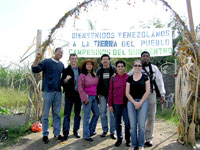Despite evictions
Farmers vow to fight for their land
By
John Parker
Los Angeles
Published Jun 30, 2006 10:03 PM
On June 13 at 5 a.m., Los
Angeles County Sheriffs deputies obeyed their marching orders from landowner
Ralph Horowitz and evicted South Central farmers from a land they have been
cultivating for 14 years-a rare green space in an industrial area of Los Angeles
that provided much-needed food to a community underserved by the
city.
|
At the South Central Farm in November 2005.
Photo: Fernando Flores
|
Close to 70 people were arrested in the raid led by hundreds of riot
police backed up by helicopters flying overhead. Many supporters of the farmers
had organized civil disobedience to defy the eviction. Some chained themselves
to trees and to each other.
This eviction came in spite of the money that
was raised by the farmers and charitable organizations that met Horowitz’
asking price of $16 million. Even Los Angeles Mayor Antonio Villaraigosa, who
until the eviction had shown no real intent to assist the farmers, made public
comments critical of Horowitz.
After celebrities like Danny Glover, Martin
Sheen, Joan Baez and especially Darryl Hannah—who refused to leave the
farm until she was arrested—got involved, Villaraigosa began to discuss
the issue in public.
At a news conference on the day of the eviction,
Villaraigosa said that he was disappointed after trying to persuade Horowitz to
sell the farm. He said that after Horowitz was notified of the available money
for purchase of the farm he then raised the price another $2
million.
Villaraigosa could have used his power as mayor to first stop the
eviction, and then begin the process of invoking eminent domain over the
property, giving the land to the farmers. In fact, the city did use eminent
domain to acquire the same property 14 years ago to use it for a garbage
incinerator.
After the Los Angeles rebellion in 1992 following the Rodney
King police brutality verdict, the city scrapped the incinerator idea as a
concession to the community. This allowed the land to be held by a public trust
and the farmers to clean up what was a dump site and turn it into a celebrated
14-acre farm.
Three hundred fifty families had plots on the land on June
12. On June 13, there were no families.
However, the farmers and their
supporters have refused to give up the fight. They are keeping up daily vigils
at the farm along with actions at the mayor’s mansion demanding that the
farm be returned to them. They are also engaged in a lawsuit that challenges the
city’s secret sale of the land to Ralph Horowitz three years ago. Since
this was public land there should have been hearings before selling it, but none
were held. The land, at the time valued at over $13 million, was sold to
Horowitz for $5 million.
Said Alberto C., one of the farmers helping to
coordinate fight-back actions: “Right now we are making sure there is no
more bulldozing on the property and waiting for the court hearing. On the north
side of the farm half of it has been destroyed. So we will be doing a hunger
strike.”
He commented on the city considering the renovation of a
coliseum for a National Football League team: “There shouldn’t be
any money for the coliseum. How can they have millions for that and none for the
farm?”
The farmers are determined to maintain their struggle.
Supporters have been asked to come to the daily vigils at the farm at 7
p.m.
“They may have cut down some of the trees and uprooted the
crops but they haven’t hurt our spirit. The land belongs to the
people,” said Alberto.
Articles copyright 1995-2012 Workers World.
Verbatim copying and distribution of this entire article is permitted in any medium without royalty provided this notice is preserved.
Workers World, 55 W. 17 St., NY, NY 10011
Email:
[email protected]
Subscribe
[email protected]
Support independent news
DONATE


